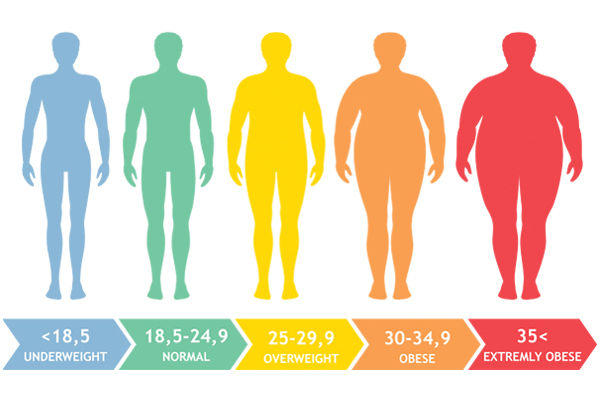When you’re questioning if there’s a definitive “wholesome weight,” right here’s the reality: There’s no excellent, absolute quantity you must aspire to attain.
Your wholesome weight is dependent upon a lot of various factors, and there’s no manner we are able to all match into the identical mildew.
With that stated, everybody has a wholesome weight — or higher but, a wholesome weight vary — they will try for to restrict their threat of weight-related well being points. Right here’s how one can estimate yours.
How one can Discover Your Wholesome Weight
Age, top, gender, bone density, muscle-to-fat ratio, and general well being can all affect how a lot you weigh.
Whereas there’s no cut-and-dried formulation for calculating your wholesome weight, there are 4 frequent metrics that medical professionals use:
Whereas these measurements received’t give you a magical quantity to purpose for, they can be utilized as a suggestion to find out a wholesome weight vary.
(Although, once more, this isn’t a precise science — it’s additionally essential to concentrate to different components, like your vitality ranges, how your garments match, and the way good you are feeling general.)
What Is Physique Mass Index (BMI)?
Physique Mass Index (BMI) is an estimation of physique fats based mostly on an individual’s weight and top.
Docs might use your BMI as a screening software to find out if you happen to’re in danger for creating obesity-related well being issues reminiscent of coronary heart illness, hypertension, sort 2 diabetes, and sleep apnea.
To calculate your BMI, divide your weight in kilos by your top in inches squared, and multiply the outcome by 703. (Or simply use an on-line BMI calculator.)
The ensuing quantity predicts the place you sit on the burden spectrum:
- Underweight = BMI <18.5
- Regular weight = BMI 18.5–24.9
- Obese = BMI 25–29.9
- Weight problems = BMI of 30 or better
You will get an thought of your advisable weight vary on your top by consulting this BMI chart from the Nationwide Institutes of Well being.
Nonetheless, the Middle for Illness Management and Prevention (CDC) notes that BMI is not a dependable methodology of measuring physique composition, which is all-important, as a result of it solely measures “extra weight” and never extra fats.
Extra weight isn’t all the time a nasty factor. Somebody who carries loads of muscle, for instance, might have a excessive BMI though their physique fats share is kind of low.
That’s why it’s essential to take different metrics, like waist circumference and boy fats share, into consideration, too.
What Is Absolute Waist Circumference?
Absolute waist circumference is a flowery time period on your waist measurement in inches. This measurement ought to be taken an inch or so above your stomach button, says vitamin scientist Eric Feigl-Ding, PhD.
“Individuals with apple-shaped our bodies — or a considerable amount of fats across the midsection — have excessive threat ranges for well being issues, particularly when their waist circumference is greater than 35 inches (for girls) or 40 inches (for males),” he explains.
How can this data show you how to decide your wholesome weight? Generally, in case your waist circumference falls under that threshold, it’s doubtless that your weight is inside a wholesome vary.
What Is Hip-to-Waist Ratio?
Like BMI and absolute waist circumference, measuring your hip-to-waist ratio is one other fast option to estimate whether or not you’re at a wholesome weight.
To calculate hip-to-waist ratio, merely divide your waist measurement (in inches) by your hip measurement (taken on the widest a part of your buttocks—additionally in inches).
The ensuing quantity can be utilized to foretell your threat of creating well being circumstances reminiscent of coronary heart illness, particularly in ladies.
For males, waist-to-hip ratios of:
- Lower than 0.9 = low threat
- 0.9 to 0.99 = reasonable threat
- 1 or above = excessive threat
For girls, ratios of:
- Lower than 0.8 = low threat
- 0.8 to 0.89 = reasonable threat
- 0.9 or above = excessive threat
Much like BMI, reducing your waist-to-hip ratio into the “low threat” vary implies that your weight is probably going in — or near — a wholesome vary.
What Is Physique Fats Proportion?
We get it: Once you’re attempting to drop a few pounds, you need to see the quantity on the dimensions go down.
However water retention, muscle mass, and hormones could cause the dimensions to fluctuate — so specializing in weight isn’t one of the simplest ways to gauge whether or not your wholesome life-style is paying off.
By conserving observe of your physique fats share, nonetheless, you may get an thought of how a lot fats you’ve misplaced — even when the quantity on the dimensions isn’t budging.
And analysis means that physique fats share — the proportion of your weight that comes from fats — could also be a higher predictor of cardiovascular threat components than BMI.
So how do you measure physique fats share? Essentially the most dependable strategies embody a DEXA (x-ray) scan, underwater weighing, or bioelectrical impedance.
A few of these strategies will be accomplished at dwelling — you possibly can store on-line for a physique fats scale that makes use of bioelectrical impedance — however for essentially the most correct estimate of your physique fats share, you’ll need to let knowledgeable do the measuring (ask your physician for a advice).
Discovering Your Wholesome Weight With out Crunching Numbers
On the subject of figuring out and reaching your objective weight, among the most essential variables can’t be calculated or measured.
Take inventory of how you are feeling general: Do you may have sufficient vitality to be as energetic as you’d like all through the day? Does your annual bodily present you’re in good well being? Are you consuming and sleeping properly?
Take note of that as an alternative of solely specializing in what you see on the dimensions.
“It’s all the time about a greater weight, not an ideal weight,” says Marty Davey, M.S., R.D. “Aiming for higher weight is far more helpful, as a result of it’s achievable. A 280-pound one that loses even 10 p.c of their weight remains to be overweight, however has lowered well being dangers. That’s a win.”




